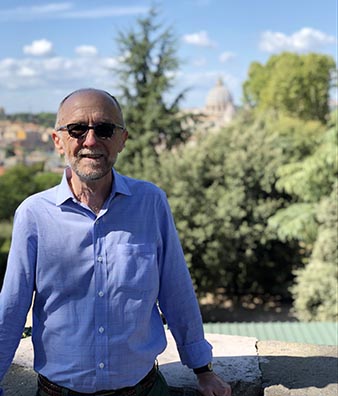Mason Engineering professor Stephen Nash’s interests are expansive and eclectic. He can talk to you about anything from the chiaroscuro of Caravaggio to the complexity of computing.
A life-long learner
Nash came to Mason in 1987 and has been here longer than many faculty and seen more changes than most. He has been a teacher, administrator, researcher, author, and senior associate dean. He has seen the university grow and change from a mostly commuter school to the commonwealth’s largest public research university. He has taught, mentored, and coached PhD students and faculty colleagues alike. He retired in May of 2020 after 33 years at the school.
Despite holding down many different jobs, Nash says he doesn’t have a favorite. “My favorite job tended to be the job that I was doing at the time,” he says. Whether he was the “proud parent” when PhD students finished their dissertations or chairing the promotion and tenure process, he found the work rewarding and stimulating.
A more recent favorite was helping develop the school’s communications and marketing team. “It was an area where at the beginning I knew little,” says Nash, “but it gave me an excuse to dive into photography and advertising and social media. Who knew that I’d become a fan of Instagram.”

Stephen Nash is pictured on one of his trips to Italy. The dome of St. Peter's Basilica is in the background. Photo provided
A passionate instructor
At heart, however, Nash is a teacher. He can clarify issues and often knows just the right word to use to explain a difficult topic. “Stephen has been a tremendous mentor to me since I joined Mason,” says John Shortle, chair of the Department of Systems Engineering and Operations Research (SEOR). “He has a gift for wisdom and is able to get to the heart of a matter, to ask the important questions. He is a passionate instructor. He has been a great leader in the department and the engineering school.”
Friend and colleague Andy Loerch, associate chair of SEOR, says, “Before I came to Mason, I worked with several graduates of the operations research program. Every one of them identified Stephen Nash as the best teacher that they had in their studies at Mason.”
Perhaps it is the advice that he gives to PhD students that earned him this reputation. He tells them to get to know the faculty and the other students and says that getting a PhD is like an apprenticeship—working closely with a faculty member to learn how to conduct research.
“It is essential to find an advisor who is a good match,” says Nash. “That includes the advisor’s particular expertise but also the advisor’s temperament and style.”
He believes students should also get to know each other because they help carry out much of the research, and through them, it is possible to find out about opportunities, promising areas of research, or perhaps even a connection between two research questions that they hadn’t noticed.”
A prolific researcher
Nash has also been a prolific researcher in the areas of scientific computing and nonlinear optimization and has co-authored two popular textbooks—the latter in a second updated edition––and numerous papers in leading professional journals.
Associate Dean and former SEOR Chair Ariela Sofer, says, “Stephen and I co-authored over 10 joint papers, as well as the two editions of our book. In the course of this collaboration, and in particular, in our work on the book we both had strong visions of what this ’creation’ should be, and we would sometimes engage in heated discussions over a single paragraph, or sentence, or even just one word. But in the end, we always compromised, and we both agreed that these battles of the minds led to a much better product.”
Sofer says that she has learned so much from Nash’s perspective, and most particularly, from his strong focus on the students’ viewpoint, a focus on translating mathematical concepts to exciting intuitive ideas. “At the time his approach was definitely nontraditional for the field, and Stephen had the foresight to step away from past traditions to make the theory and methods of our field far more accessible,” says Sofer.
Reflections on the past and plans for the future
As he leaves Mason Nash reflected on how things have changed. He says, “There is a whole lot of ‘more’ now. More students, more programs, more research, more campuses, more activities, more everything.”
He considers the most important change to be the change in the university’s personality. “Mason used to be a university focused mostly on teaching with mostly part-time students. At around five o’clock in the afternoon, the campus would go to sleep, except for the brief bursts of traffic when the graduate classes ended. That university no longer exists,” he says. “We now have a community. There is a large population of students who live on campus. There are vibrant research projects that bustle at all hours. There is a sense of pride in the university, and a commitment to its achievements that didn’t exist before.”
Nash believes that this pride and commitment are essential to the success that we have seen, and to the successes yet to come.
During retirement, Nash plans to build on his recent fascination with all things Italian. “My family has roots in Italy. I’ve been learning Italian, and last week I even switched to Italian Siri. “Ehi Siri, che tempo fa oggi?” * He has made trips to Italy, organized around cycling in various areas of the country.
He was planning to go to Venice and Bologna to celebrate his retirement, but that trip has been postponed. So, he will have to enjoy Italian food at home for now. “I recently made myself a special rolling pin for rolling out sheets of pasta," says Nash. "I’m guessing that this obsession is going to keep me busy.”
‑‑‑‑‑‑‑‑‑‑‑‑‑‑‑‑‑‑‑‑‑‑‑‑‑‑‑‑‑‑‑‑‑‑‑‑‑‑‑‑‑‑‑‑‑‑‑‑‑‑‑‑‑‑‑‑‑‑‑‑‑‑‑‑‑‑‑‑‑‑‑‑‑‑‑‑‑‑‑‑‑‑‑‑‑‑‑‑‑
*Che tempo fa oggi? = What is the weather like today?
